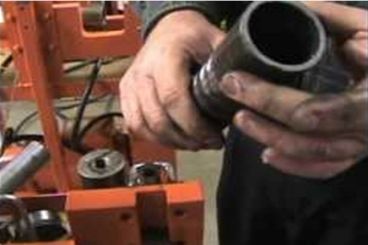
End Forming Basics for Tube and Pipe Connections
One of the main purposes of end forming in tube and pipe fabrication is to link two pipes together in some way, shape or form. Typically, you are either EXPANDING one pipe end to fit over another, or REDUCING one to fit inside another.
Expanding is frequently done in one of two ways: 1. By driving a solid die into a tube or pipe and forcing the material outward or 2. With segmented expander tooling pushing out from inside the tube to widen it. Either can control the material diameter. Solid tool expanding creates a more uniform expansion, while segmented tooling is often more practical in implementation.
Reducing can be done by forcing a solid die over the top of a tube end to reduce it. Segmented finger reduction is also done with segmented fingers collapsing down on the material to reduce the diameter.
A number of more interesting and secure connections can be made with the right tooling … ball joints, v-band connections, NORMA or MARMOM-type joints. These are accomplished with similar end forming techniques as mentioned above, and the right tooling.
Huth-Ben Pearson International provides end forming equipment and tooling that is powerful and extremely versatile, and surprisingly affordable. You can expand tubes up to 6 inches with our standard cylinders (if you need more than that, we can easily help you!). With our standard equipment, you can reduce diameters up to 3 inches. Did you know that you can reduce pipe up to a wall thickness of .145 inch (Schedule 40)?
Watch the video! You should know we are actively working on ways to allow you to do even more with our bending and end forming equipment!
Call us with your ideas, challenges or problems! We are here to help … 800-558-7808
